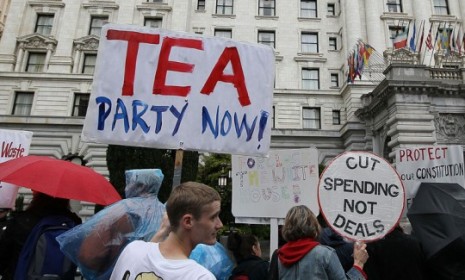Does America need a third party?
The two-party system is failing America, says The New York Times' Tom Friedman — joining a rising chorus calling for a new alternative

A free daily email with the biggest news stories of the day – and the best features from TheWeek.com
You are now subscribed
Your newsletter sign-up was successful
A growing list of centrists — most recently joined by New York Times columnist Thomas Friedman — say America needs a third political party to offer a moderate alternative to the Democrats and Republicans. The inadequate attempts that the "two-party duopoly" has made to address the financial meltdown, the health-care crisis, and other national emergencies demonstrates, says Friedman, how badly we need a "serious third party" that can navigate such waters directly and honestly without worrying about offending special interests. Is he right?
What a tired, silly idea: This third-party nonsense is getting "tiresome," says Steve Benen at Washington Monthly. Do its proponents really believe that some "magical entity" could "establish a 'consensus' among people with sincere disagreements," and successfully pass "a bolder, more sweeping version of the Democratic agenda"? Friedman's time and clout would be better spent pitching "good ideas" and persuading people of their merit.
The Week
Escape your echo chamber. Get the facts behind the news, plus analysis from multiple perspectives.

Sign up for The Week's Free Newsletters
From our morning news briefing to a weekly Good News Newsletter, get the best of The Week delivered directly to your inbox.
From our morning news briefing to a weekly Good News Newsletter, get the best of The Week delivered directly to your inbox.
Not so fast — a third party could thrive: Voters have a "much lower" opinion of the Democrats and Republicans than they did in 1992, says Nate Silver at The New York Times, when Ross Perot failed to offer a tempting presidential alternative — and they no longer identify with either party so readily. If Republicans nominate a "polarizing" 2012 candidate, and Obama's poll numbers don't rise, a third-party candidate might have a shot at the White House.
"Odds against third-party bid not as long as they seem"
We need a third party — the Tea Party: Voters are angry enough to support a third party, says Fred Witzell at American Conservative Daily, but it won't be the one that "Obama fan(s)" are dreaming will ram through a bigger stimulus and socialize health care. The Tea Party, with its call for limited government and a return to fiscal responsibility, can jump from grassroots movement to third party if it can organize nationally. That would restore "integrity" to U.S. politics.
"The Tea Party as a third party?"
A free daily email with the biggest news stories of the day – and the best features from TheWeek.com
-
 What to know before filing your own taxes for the first time
What to know before filing your own taxes for the first timethe explainer Tackle this financial milestone with confidence
-
 The biggest box office flops of the 21st century
The biggest box office flops of the 21st centuryin depth Unnecessary remakes and turgid, expensive CGI-fests highlight this list of these most notorious box-office losers
-
 What are the best investments for beginners?
What are the best investments for beginners?The Explainer Stocks and ETFs and bonds, oh my
-
 The billionaires’ wealth tax: a catastrophe for California?
The billionaires’ wealth tax: a catastrophe for California?Talking Point Peter Thiel and Larry Page preparing to change state residency
-
 Bari Weiss’ ‘60 Minutes’ scandal is about more than one report
Bari Weiss’ ‘60 Minutes’ scandal is about more than one reportIN THE SPOTLIGHT By blocking an approved segment on a controversial prison holding US deportees in El Salvador, the editor-in-chief of CBS News has become the main story
-
 Has Zohran Mamdani shown the Democrats how to win again?
Has Zohran Mamdani shown the Democrats how to win again?Today’s Big Question New York City mayoral election touted as victory for left-wing populists but moderate centrist wins elsewhere present more complex path for Democratic Party
-
 Millions turn out for anti-Trump ‘No Kings’ rallies
Millions turn out for anti-Trump ‘No Kings’ ralliesSpeed Read An estimated 7 million people participated, 2 million more than at the first ‘No Kings’ protest in June
-
 Ghislaine Maxwell: angling for a Trump pardon
Ghislaine Maxwell: angling for a Trump pardonTalking Point Convicted sex trafficker's testimony could shed new light on president's links to Jeffrey Epstein
-
 The last words and final moments of 40 presidents
The last words and final moments of 40 presidentsThe Explainer Some are eloquent quotes worthy of the holders of the highest office in the nation, and others... aren't
-
 The JFK files: the truth at last?
The JFK files: the truth at last?In The Spotlight More than 64,000 previously classified documents relating the 1963 assassination of John F. Kennedy have been released by the Trump administration
-
 'Seriously, not literally': how should the world take Donald Trump?
'Seriously, not literally': how should the world take Donald Trump?Today's big question White House rhetoric and reality look likely to become increasingly blurred